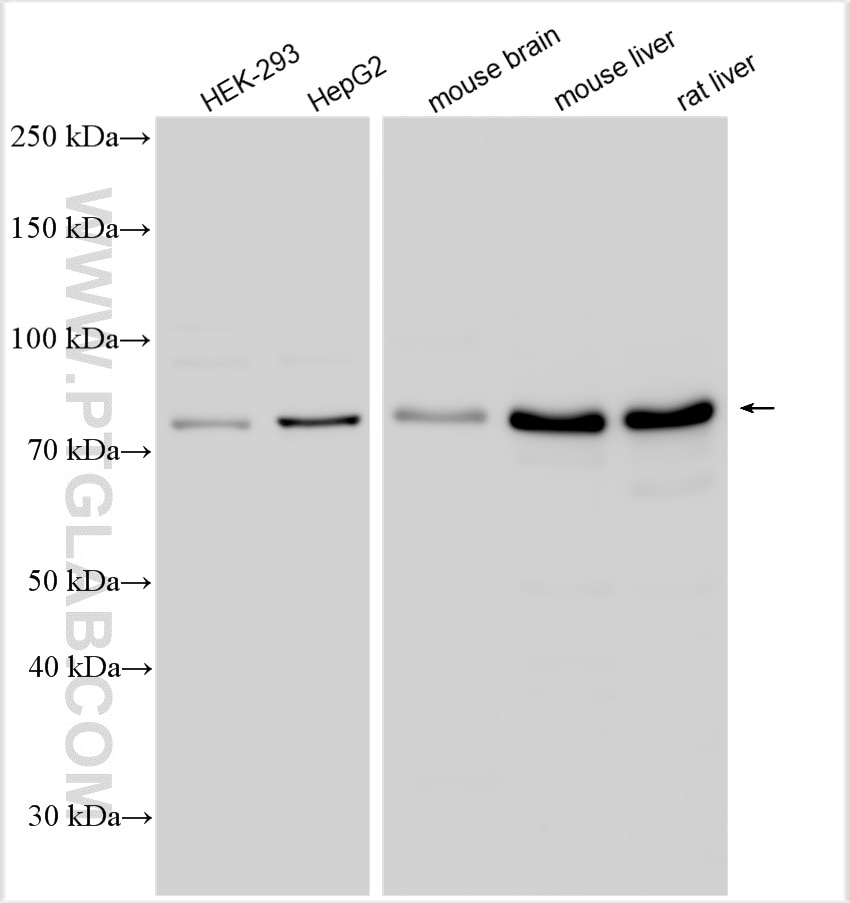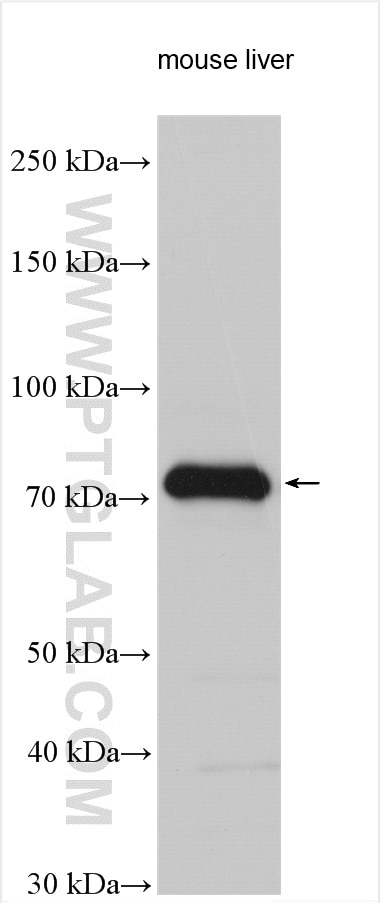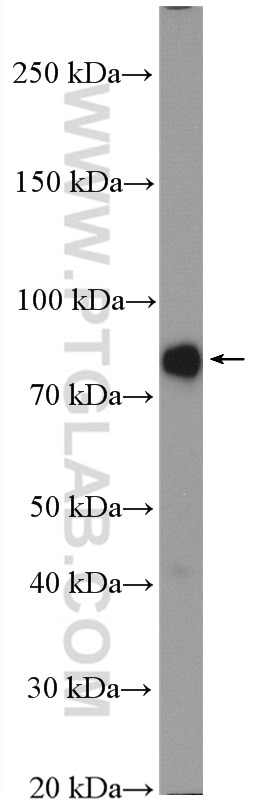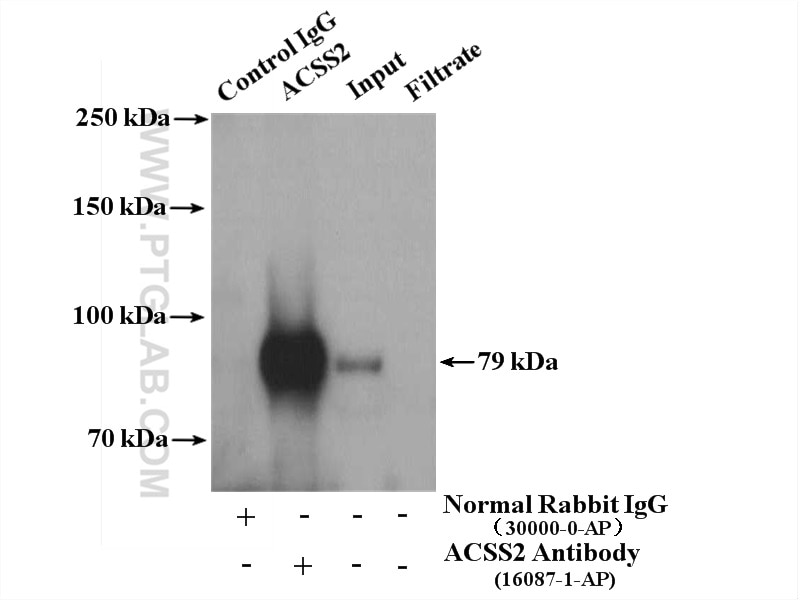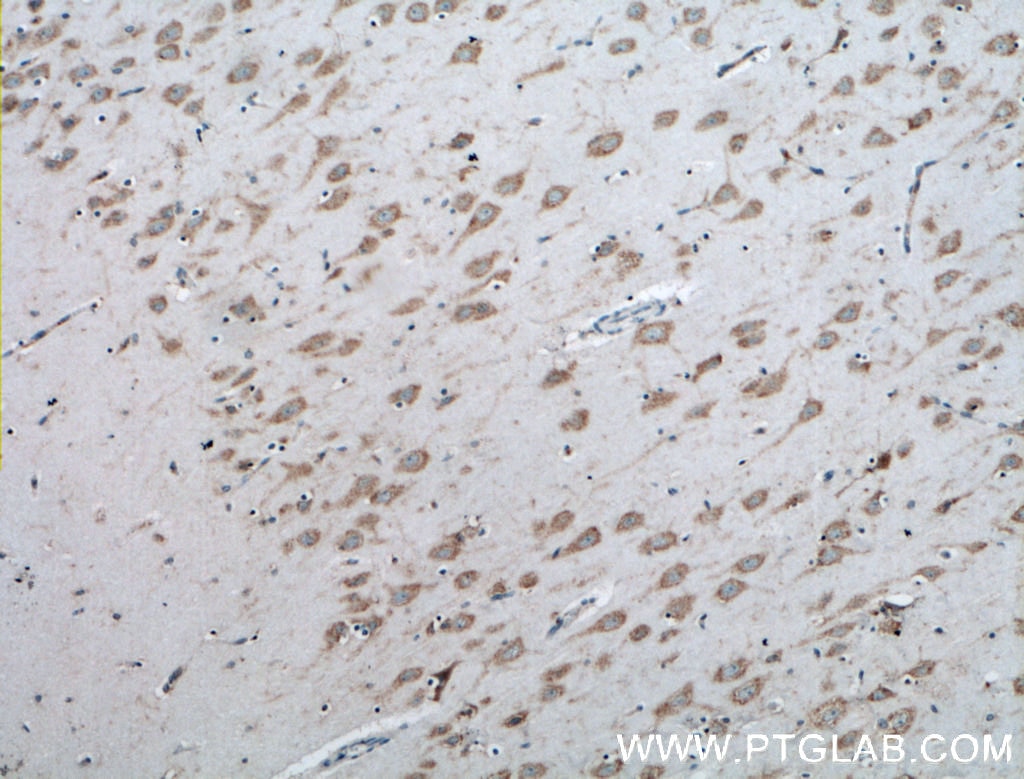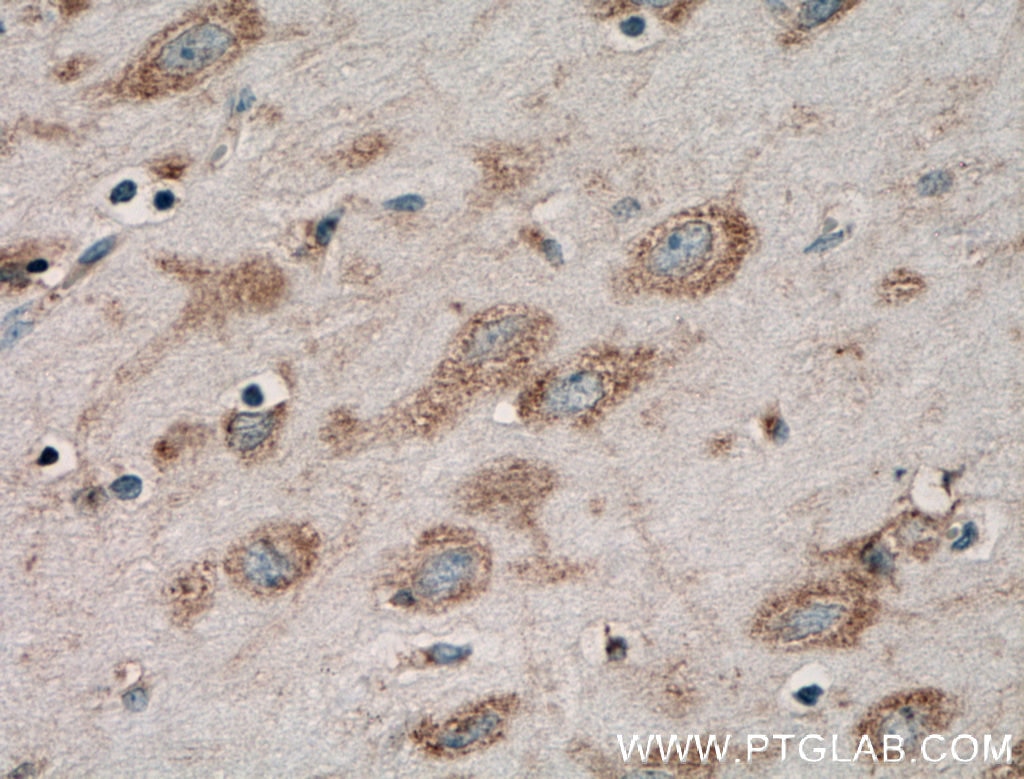- Phare
- Validé par KD/KO
Anticorps Polyclonal de lapin anti-ACSS2
ACSS2 Polyclonal Antibody for WB, IP, IHC, ELISA
Hôte / Isotype
Lapin / IgG
Réactivité testée
Humain, rat, souris et plus (1)
Applications
WB, IP, IF, IHC, ELISA
Conjugaison
Non conjugué
N° de cat : 16087-1-AP
Synonymes
Galerie de données de validation
Applications testées
| Résultats positifs en WB | cellules HEK-293, cellules HepG2, tissu cérébral de souris, tissu hépatique de rat, tissu hépatique de souris |
| Résultats positifs en IP | cellules HepG2, |
| Résultats positifs en IHC | tissu cérébral humain, il est suggéré de démasquer l'antigène avec un tampon de TE buffer pH 9.0; (*) À défaut, 'le démasquage de l'antigène peut être 'effectué avec un tampon citrate pH 6,0. |
Dilution recommandée
| Application | Dilution |
|---|---|
| Western Blot (WB) | WB : 1:1000-1:6000 |
| Immunoprécipitation (IP) | IP : 0.5-4.0 ug for 1.0-3.0 mg of total protein lysate |
| Immunohistochimie (IHC) | IHC : 1:50-1:500 |
| It is recommended that this reagent should be titrated in each testing system to obtain optimal results. | |
| Sample-dependent, check data in validation data gallery | |
Applications publiées
| KD/KO | See 1 publications below |
| WB | See 11 publications below |
| IHC | See 2 publications below |
| IF | See 2 publications below |
Informations sur le produit
16087-1-AP cible ACSS2 dans les applications de WB, IP, IF, IHC, ELISA et montre une réactivité avec des échantillons Humain, rat, souris
| Réactivité | Humain, rat, souris |
| Réactivité citée | rat, Humain, porc, souris |
| Hôte / Isotype | Lapin / IgG |
| Clonalité | Polyclonal |
| Type | Anticorps |
| Immunogène | ACSS2 Protéine recombinante Ag9121 |
| Nom complet | acyl-CoA synthetase short-chain family member 2 |
| Masse moléculaire calculée | 701 aa, 79 kDa |
| Poids moléculaire observé | 79 kDa |
| Numéro d’acquisition GenBank | BC010141 |
| Symbole du gène | ACSS2 |
| Identification du gène (NCBI) | 55902 |
| Conjugaison | Non conjugué |
| Forme | Liquide |
| Méthode de purification | Purification par affinité contre l'antigène |
| Tampon de stockage | PBS avec azoture de sodium à 0,02 % et glycérol à 50 % pH 7,3 |
| Conditions de stockage | Stocker à -20°C. Stable pendant un an après l'expédition. L'aliquotage n'est pas nécessaire pour le stockage à -20oC Les 20ul contiennent 0,1% de BSA. |
Informations générales
Acetyl-CoA Synthetase 2 (ACSS2) is also named as acyl-CoA synthetase short-chain family member 2. Acetyl-CoA Synthetase 2 (ACSS2) is responsible for lipogenesis by synthesizing acetyl-CoA from acetate for lipogenesis and promotes acetylation in nuclear (PMID: 29444517). It is also required for cell migration and invasion in renal cell carcinoma (RCC) through the promotion of autophagy (PMID: 29281714). ACSS2 has two isoforms with the molecular weight of 78 and 80 kDa.
Protocole
| Product Specific Protocols | |
|---|---|
| WB protocol for ACSS2 antibody 16087-1-AP | Download protocol |
| IHC protocol for ACSS2 antibody 16087-1-AP | Download protocol |
| IP protocol for ACSS2 antibody 16087-1-AP | Download protocol |
| Standard Protocols | |
|---|---|
| Click here to view our Standard Protocols |
Publications
| Species | Application | Title |
|---|---|---|
Mol Cell Acetyl-CoA Derived from Hepatic Peroxisomal β-Oxidation Inhibits Autophagy and Promotes Steatosis via mTORC1 Activation. | ||
Plant Physiol FDX5 deletion affects metabolism of algae during the different phases of S-deprivation. | ||
Antioxidants (Basel) Bisdemethoxycurcumin Alleviates Dextran Sodium Sulfate-Induced Colitis via Inhibiting NLRP3 Inflammasome Activation and Modulating the Gut Microbiota in Mice | ||
Neurosci Lett Anti-depressant effects of acupuncture: The insights from NLRP3 mediated pyroptosis and inflammation. | ||
Exp Ther Med hsa-miR-15b-5p regulates the proliferation and apoptosis of human vascular smooth muscle cells by targeting the ACSS2/PTGS2 axis. | ||
Nat Metab The SESAME complex regulates cell senescence through the generation of acetyl-CoA.
|
Avis
The reviews below have been submitted by verified Proteintech customers who received an incentive forproviding their feedback.
FH Kishor (Verified Customer) (01-30-2019) | Good results in western blotting at 1:1000 dilution for human cell lines and rat liver tissue.
|
